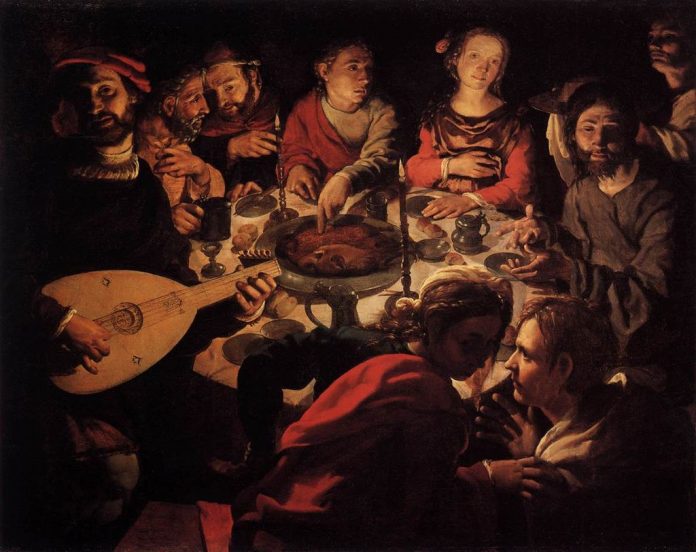
Dedicated to Rita Ann Knuffman
As the old proverb, now meme, goes, “Blood is thicker than water”. Blood meaning family, and more specifically, individuals who share a blood relationship to each other and water of course is everyone else, friends, neighbors, strangers, and perhaps in-laws. Thicker can only be construed as greater than, better than, more important than. Anyone married or related through a marriage has probably experienced both thicker and thinner. The idea of it seems justified, it helps us stay comfortable with the validity of our own familial histories and loyalties in stark contrast to the often perceived dubious and indeed unknown perspectives of everyone else. This is well illustrated by the joke:
Question: “What’s the difference between an In-Law and an Out-Law?”
Answer: “An Out-Law is wanted.”
The recent loss of my wife’s mother prompted some serious reconsideration of the in-law meme, because, in this case, it simply didn’t apply. She was a person of deep Catholic faith and traditional family values and never treated her in-laws as anything but true family members. It seemed so natural for her, and so unnatural to my expectation. And the strangest part, she received reciprocal respect, it was infectious. I wanted to do for her as I would my own mother. To better appreciate her wonderful approach to marriage and in-laws, I took a second look at one of the more prominent scriptural marriages, the Wedding at Cana.
In the New Testament, John 2:11 describes a Wedding at Cana to which Jesus, his mother, and disciples were invited. In the middle of the festivities, the wine runs out. Clearly, without wine, there would be embarrassment, the marriage and future relations might be severely damaged. But Jesus remedies the situation by turning several jars of water into wine, a red wine, a good wine. The wedding is quietly saved, strife abated, and all is at peace again. This was Jesus’s first miracle, his coming out so to speak. But as miracles go, it seems superfluous, certainly far less important than the raising of Lazarus by contrast. One would think Jesus would want to start things off with a big splash, not something so esoteric.
There are many perspectives on the meaning of this miracle. Pope Benedict XVI cemented the importance of the miracle in his homily on the feast of Epiphany:
John’s Gospel … invites us to consider as an “epiphany” the Wedding at Cana, during which, by changing the water into wine, Jesus “manifested his glory; and his disciples believed in him” (Jn 2:11).
As with many scriptural passages, attributions of meaning vary widely. Some think Cana represents Christ’s approval of marriage and earthly celebrations. Others refer to it as an argument against teetotalism. These interpretations all have merit in the context of the interpreter. None of these interpretations, however, seem directed at marriage and resulting family relations. Perhaps an understanding of why Jesus might choose a wedding for his first miracle is significant. After all, it could have been performed anywhere; someone’s home for a dinner party, a vineyard, or perhaps a pub. In all of these situations, the same previous interpretations can be gleaned. But a wedding has a uniquely interesting feature compared to any other random venue which could provide the perfect situation for Jesus to reveal his future intentions.
The purpose of a wedding, at its essence, is a place where strangers are transformed into family, or, substituting the words from the old proverb, water is transformed into blood. This is key. In the scriptures, wine and blood are synonymous with Jesus, so at Cana, Jesus’ miracle can also be seen as transforming water into blood, the wine. Jesus might be using a wedding for his first miracle because the wedding itself is an analogy to explain the miracle. The transformation of water to wine represents, in the context of a wedding, the transformation of each of us as strangers, water, into family, wine, or blood, Jesus’ blood. This may be why Jesus chose the Wedding at Cana as the site for his first miracle, it represents the entirety of his teachings to come, that Jesus will be the transformer who can turn us all from strangers into his blood relatives. In this perspective, Jesus’ first miracle was indeed a big splash.
There is another, and perhaps instructive, reverse aspect of this interpretation as relates to the two marriage families. Because Jesus performs the miracle at a wedding, the miracle can also be seen as an analogy for marriage. In that regard, Jesus is elevating marriage beyond name and property transfer alone, he would be saying that a marriage, like the miracle, transforms its participants into blood relatives with Jesus again as the transformer. Given this idea, how much more important does the value of marriage become at Cana especially with respect to an understanding of in-laws. Jesus transforms water into wine and so also marriage transforms our mothers-in-law into our mothers and our sons and daughters in-law into our sons and daughters.
Perhaps my late mother-in-law inherently understood and practiced these ideas. Certainly her deep respect for marriage, especially as related to her faith, contributed to her easy acceptance of in-laws as true family. Her scriptural understanding of marriage meant that she didn’t differentiate between “us” and “them”, there was simply all of us.










